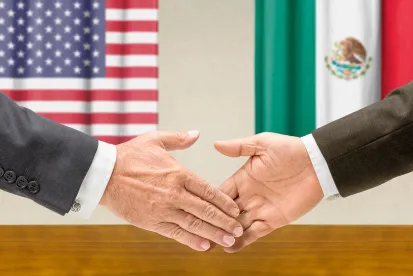Mexico continues to face challenges in 2021, as it continues to grapple with economic fallout from the global COVID pandemic and amid policy shifts emanating from the United States, as President Joe Biden assumed the office in January. Mexican President Andrés Manuel López Obrador, 67, also tested positive for coronavirus after a recent business trip; he is currently quarantining at the National Palace in Mexico City.
Within his first three days of office, President Biden issued several executive orders. Among these, executive action included halting funding for the construction of the wall along the U.S.-Mexico border and preserving a path forward for those individuals brought illegally to the United States as a child by their parents that are now adults (so called “Dreamers”/ Deferred Action for Childhood Arrivals “DACA” program recipients). President Biden also signed letters that had the United States rejoining the Paris Climate Agreement and halted the U.S. withdrawal from the World Health Organization. Notable for Mexico, President Biden appointed Ambassador Roberta Jacobson as his southwest border coordinator within the National Security Council.
President López Obrador spoke with President Biden on January 22, reviewing bilateral cooperation on a range of bilateral and regional issues. The two leaders agreed to work closely to address the flow of migrants from the broader southern region to Mexico and the United States, as well as to promote development in the Northern Triangle of Central America (El Salvador, Guatemala, and Honduras) to stem this flow. They also recognized the importance of coordinating on COVID-19, which included extending the agreement of keeping the land border closed to non-essential travel until at least February 21, 2021.
Mexico, the second largest economy in Latin America, was resilient prior to COVID and the government continues to seek out opportunities to improve the economy and citizens wellbeing. In January, the Mexican federal government laid out a COVID relief plan that includes providing loans to 60,000 small businesses affected by the coronavirus pandemic. Restaurants and tortillerías (tortilla shops) are among those small businesses able to qualify for the loans of up to 250,000 pesos (US$12,740).
Mexico also continues to expand its market access overseas. This included securing a Trade Continuity Agreement with the United Kingdom (U.K.), as the U.K. transition period from the European Union concluded. Both countries established transitional mechanisms to maintain preferential tariff treatment for Mexican imports in the U.K., effective January 1, 2021. Meanwhile, U.K. imports will be subject to Most Favored Nation (MFN) rates in Mexico. Companies that import U.K. goods into Mexico should take into consideration the impact the impact the transitional mechanisms could represent to their supply chain, as the two countries work to reach a longer-term agreement. Mexico and the U.K. are set to begin negotiations on a new free trade agreement this year.
Within the framework of the United States-Mexico-Canada Agreement (USMCA), Mexico has been supportive of the United States automobile industry by extending the time to transition and comply with the higher content requirements under the new trade deal, which includes a 75% North American content (compared with a 62.5% threshold under the old North American Free Trade Agreement). Democratic lawmakers in Washington, however, are urging the Biden Administration to keep pressure on Mexico’s labor and environment obligations in the agreement. A group of 122 Democratic lawmakers more recently sent a letter to President Biden urging him to incorporate the Paris Climate Agreement into the USMCA.
In agriculture, Mexico continues to maintain conversations with the U.S. agriculture sector, in hopes of resolving long-standing disagreements on tomatoes, strawberry and bell peppers (seasonal produce) and achieving a deal that supports both economies. While not a dispute, it is expected that avocado imports and consumption will continue to increase in the United States, especially guacamole consumption with the upcoming Super Bowl watching parties (February 7).
Under the Trump Administration, the U.S. International Development Finance Corporation (DFC) focused on Mexico’s energy sector, signing a letter of interest in 2019 to finance a natural gas pipeline developed by Rassini S.A.B. de C.V. in the country’s southern states. The Biden Administration, however, is moving away from a focus on oil and gas domestically toward green sustainable energy initiatives that align with Paris Climate Agreement targets and goals. It remains to be seen how supportive the Biden Administration will be toward gas pipeline projects in Mexico, including those that have the potential to serve other markets, such as the Northern Triangle countries. Nevertheless, the DFC and the U.S. Export-Import Bank remain a valuable resource for American investments in Mexico, especially those that align with the Mexican government’s economic agenda in 2021.





 />i
/>i

